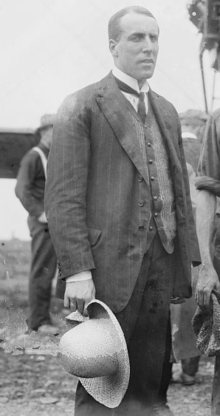John Cyril Porte
| John Cyril Porte | |
|---|---|

Porte on 22 June 1914, day of the naming ceremony for Wanamaker's America
|
|
| Born |
26 February 1884 Bandon, County Cork, Ireland |
| Died | 22 October 1919 (aged 35) Brighton, England |
| Cause of death | Pulmonary tuberculosis |
| Nationality | British |
| Occupation |
Inventor Aviator Company director |
| Known for |
Navigation Air racing Transatlantic flight Seaplane Experimental Station Anti-submarine warfare Flying boats |
| Military career | |
| Allegiance |
|
| Service/branch |
|
| Years of service | 1898-1911, 1914-1919 |
| Awards |
Order of St Michael and St George Navy Distinguished Service Medal (United States) |
Colonel John Cyril Porte CMG FRAeS RN (26 February 1884 – 22 October 1919) was a flying boat pioneer associated with the World War I Seaplane Experimental Station at Felixstowe.
Porte was born on 26 February 1884 to Reverend John Robert Porte (1849–1922) TCD and Henrietta (née Scott) in Bandon, County Cork, Ireland. Reverend Dr. Porte served as Rector of St Peter's, Ballymodan, Bandon before moving to England with his family as Vicar of St Matthew's church, Denmark Hill in 1890. Rev. Porte's father, George Porte (1819–1892) was a Civil Engineer living in Dublin, member of the Royal Irish Academy and Fellow of the Royal Geological Society of Ireland.
Porte joined the Royal Navy in 1898, passing through HMS Britannia before joining HMS Royal Oak. He transferred to the Royal Navy Submarine Service in 1906 receiving his training on HMS Thames before HMS Forth and duties on submarines, his first command was HMS B3 in 1908. In 1910 he joined HMS Mercury for duties on a Holland-class submarine, taking over HMS C38 on 31 March 1910. It was during his service as a submariner that Porte contracted tuberculosis, being discharged in 1911 with the rank of Lieutenant, RN. He was also assigned to HMS President in London for a flying course.
...
Wikipedia
